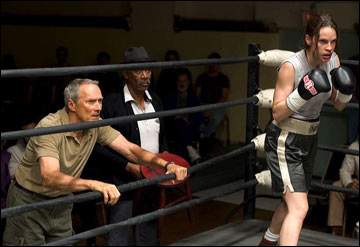




|
9 out of 10 |
 |
|
At an age when most are retired or retiring, director Clint Eastwood is at the top of his directorial game with Million Dollar Baby. His confident and deliberate style is complimented by strong acting throughout from the main characters, and Hillary Swank in particular is incredibly natural and convincing as the strong-willed rookie boxer, Maggie. Maggie is a 30 year old “white-trash” nobody, who has scraped by a living as a waitress since the age of 13 and shows up at Frankie’s gym determined to change the course of her dead-end life. Frankie (Clint Eastwood) is the crusty old trainer who initially refuses to train a woman. “I don’t train girls.” Scrap (Morgan Freeman) is a washed up boxer who runs the gym. He used to train with Frankie, but a particularly brutal beating in the ring cost him an eye many years ago, and Frankie has never forgiven himself for not stopping that fight. Eventually, Frankie agrees to train Maggie, and everyone is surprised when she starts destroying all challengers in her path. During her training, and as her career begins to take off, Frankie and Maggie develop a strong father-daughter bond, and we sense that neither of them has experienced anything quite like it previously. When Maggie buys her mother a house with her winnings, her mother’s reaction is selfish almost beyond belief, and she is so condescending and dismissive of Maggie’s accomplishments that it becomes obvious why Maggie so desperately needs to prove herself. Eastwood’s pacing is excellent throughout Million Dollar Baby, ranging from exciting and well shot boxing matches to quiet conversations, and is balanced throughout by the steady and deliberate routine of the gym. A side plot involving the other members of the gym is given enough screen time to be effective in its own right, and allows Eastwood to reveal more about Scrap while Frankie and Maggie are busy with her fledgling career. The dialogue between Frankie and Scrap is very authentic and natural and quite often is more about what is not said than what is. The film switches gears at the end of the second act suddenly and unexpectedly, but Eastwood makes it work, and by the end of the film it rings true. A heartwarming, inspirational,
and finally heartbreaking story of tenacity, pride, guilt, and forgiveness
that should not be missed by fans of serious cinema.
Film Critic: - Donald McLean |
|